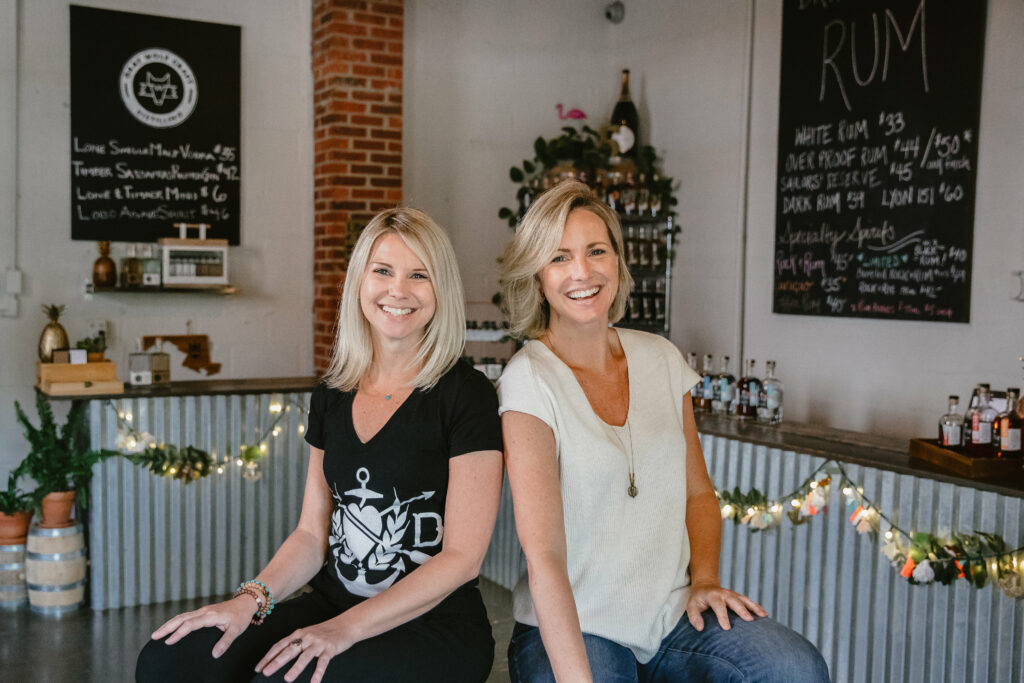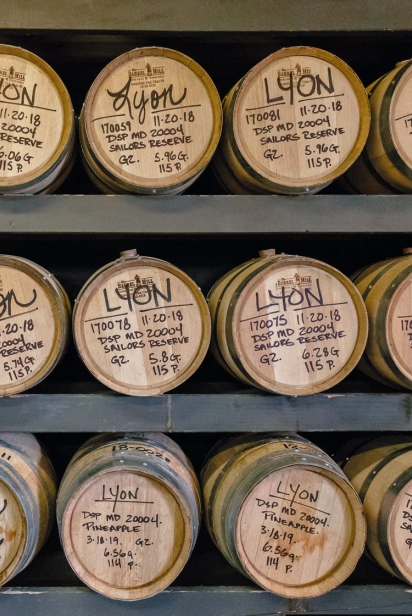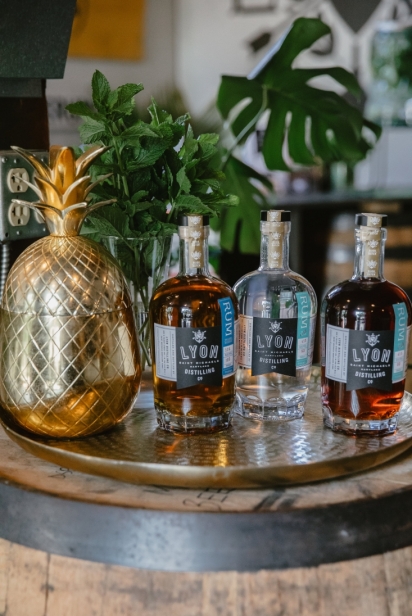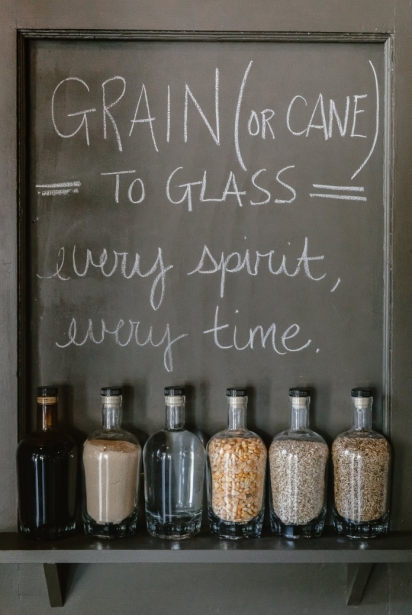By Lydia Woolever
Photography By Caroline J. Phillips | July 25, 2019

Jaime Windon shouldn’t be sitting here on this quiet Monday morning in the middle of May, drinking her tea out of a teal “Boss Lady” mug and shooting the breeze with her staff as they bustle through this aptly named Booze Factory that has become her second home. In fact, looking at the way her life unfurled before arriving on this spit of tidewater, she should’ve left St. Michaels long ago.
Before she landed in Talbot County, Jaime Windon was a woman of many lives, bopping across the country and around the world as a freelance photographer, barely setting down roots before she was onto the next place, ending up on Maryland’s Eastern Shore not expecting to stay much longer than the summer.
“If you had made me put money on it, I probably wouldn’t have thought I’d be here a year,” she says with wide eyes and an infectious smile. “There was no long-term plan. There was never a strategy. This wasn’t supposed to be a business.”
But here she is, a half-dozen years later, about to start what will undoubtedly be another busy week for her little rum company, Lyon Distilling, which is now in its fifth and most successful year to date. And along the way, she has helped not just create some of the most beloved booze in Maryland but also bring craft distilling back to a state with a spirited history.
Today, there are some two dozen distilleries across the Land of Pleasant Living, from Ocean City to Baltimore City, but back when Lyon Distilling opened in 2013, the local craft booze scene was not even a shadow of what it now is. Lyon itself was the first distillery to make rum and whiskey in the state since Pikesville Rye stopped local production in 1972.
Even St. Michaels was somewhat different then, with the sleepy town largely seen as a prime place to retire. But luckily for Lyon, the adjacent St. Michaels Winery and Eastern Shore Brewery had already zoned their pocket of town for booze. “For me, it was all about filling a need,” says Jaime. “You had a brewery, a winery, all the food you could ever want to eat, but you didn’t have any local spirits. I wanted to do something different, and rum was just a natural fit.”
At first, you might ask: why rum? Especially in a state so historically steeped in rye whiskey. But dig a little deeper and it all starts to come together. For starters, St. Michaels might be one of the last true salty-dog sailors’ towns along the East Coast, so the spirit of Mai Tais and Dark ‘n Stormies only made perfect sense. Going back even further, though much history was lost or destroyed back during Prohibition, it is known that Maryland had five working rum distilleries during the 1700s.
Rum was in fact the first liquor produced in bulk by the American colonies, which sourced sugar cane and molasses from another English territory—the West Indies. One could claim that the only reason rum fell to the wayside was the Revolutionary War, when trade was disrupted and American-grown grains moved to the forefront, leading to the rise of whiskey.
Jaime had read about this history in a book called And A Bottle of Rum by booze historian Wayne Curtis and was instantly hooked. Her co-founder, Ben Lyon, from whom the distillery gets its name, had some experience in distilling, and so the two started what was supposed to be a fun side project. “It wasn’t like, ‘Let’s become the next Bacardi,’” says Jaime. “We just thought, ‘Let’s make rum, and let’s see where it goes.’ But of course, the public demand and growing industry had other plans.”
Lyon Distilling Company opened its doors in December 2013, using two small stills to turn out about six gallons, or 30 bottles of white rum, a week. From day one, they were always sold out, open only on Saturdays and often leaving a little sign outside that read: “More rum in seven days.”
But that white rum, which Lyon still makes today, was only the canvas for all that was to come. From there, they purchased a few small whiskey barrels to evolve the original distillate in color, flavor, and nuance in the booze-soaked oak wood. Over time, three signature rums, three overproof rums, three steady liqueurs, and four seasonal options would all come online, too.
Yet even as their product line has evolved, every ounce still starts as Louisiana sugar cane and molasses, which is fermented and distilled on site five days a week to now make more than 20,000 bottles by hand a year.
“There are a lot of ways to do things a lot faster, because making booze is a long, arduous, refined task that costs a lot of money and takes a lot of labor,” says Jaime. “But it’s very important to us that every drop is made here. It’s about everything with intentionality.”
For that, Lyon Distilling is in the process of discontinuing its whiskey line, and by mid-summer, the company will officially be 100% rum. “Rum is the most creative spirit,” says Jaime. “There aren’t as many rules or expectations. If anything, there’s a lot of preconceived notions because it gave you a hangover in college. But we have the opportunity to change that, and we’re coming up with new ideas all the time.”
One example is the coconut rum, which made its debut last summer. This project has been the baby of Jessi Windon, Jaime’s little sister, who toasts the coconut by hand before it gets worked into a recipe that was perfected over many months. This year’s first batch sold out in five days.

Jessi arrived in St. Michaels in a similar way to Jaime. After the distillery got up and running, “There were so many places she needed to be at once that she was always joking, ‘If only I could clone myself!,’ which obviously was me,” says Jessi with a laugh, as the two do both look and sound alike. A month after opening, she came to town to help out in the Lyon tasting room for what was supposed to be a temporary stay. “Five years later, I’m still here, and I honestly couldn’t be happier,” says Jessi today.
In that time, she’s become Jaime’s right-hand woman, handling and expanding the company’s distribution from a few locations across Maryland to some five different states, including Delaware and Washington, D.C. Her business card reads “Rum Runner,” and five days a week, she packs her car full of rum cases and road-warriors between all the liquor stores, bars, and restaurants that hawk their handcrafted spirits.
All the while, the rest of the company has grown, too—and fast. In the early days, the distillery received one especially glowing review from The Washington Post that brought booze-lovers out in droves, and before long, Lyon needed to cobble together a larger crew, who they’d sometimes pay in rum.
“It became a very team effort, which was new to me, because I’d never been a part of a team before,” says Jaime. “When you’re self-employed, you’re all self-sustaining—you have to be—and I really like doing everything. But there’s no way to grow without giving some of that up. That has been the hardest part, but also the most rewarding one, because my team is doing things better than I ever could.”
Before she knew it, Jaime had 11 employees, now including Nic McMorris, who works production, and Marisol Burns, who bottles the booze and runs the tasting room, both among many other tasks. Each employee wears a dozen hats and it’s an all-hands-on-deck operation, with Jaime herself often slinging rum from behind a tropical table at an event or farmers’ market. It creates an even playing field, with everyone on the staff having a sense of autonomy, ownership, and influence.
“Working here, you find out who you are and what your strengths are in this industry,” says Brett Steigerwaldt, the resident mad-scientist distiller who was the company’s first real hire in 2016. His booze infusions, like the coffee liqueur, have become Lyon staples, and he’s currently working on a top-secret botanical line that will include creatives riffs on historically significant spirits. “It’s a crazy, weird, fun life,” he says, surrounded by bottles of test concoctions.
As Jaime sees it, starting a business isn’t easy, but growing it, developing it, and making it sustainable is the real hard work, and she credits the company’s success to this motley crew of talented creatives that she has gathered around her, though they won’t let her be so modest.
“Every day, we bear witness to Jaime bending over backwards to keep this company running and to ensure success for this brand and for all of us,” says Brett. “This all comes from her, and I’m constantly inspired by her ability to inspire her team. It’s apparent in the happiness and joy that everyone exudes when they talk about their job here. Some days are harder than others, but every day is a joy.”

At the same time, there have been changes, too. Jaime’s co-founder, Ben, left the company over a year ago, though they have no plans to change the name. And a beloved bunch of employees, like Pat Gruner, Sarah Schorr, and Courtney Gorman, have recently moved on to other jobs and states. For three years now, too, husband-and-wife duo R.B. Wolfensberger and Meghan Brown have brought their own touch to the Booze Factory with their Gray Wolf Craft Distilling, sharing the same space and equipment with Lyon while becoming a local favorite all on their own.
And that’s not even counting the craft spirits industry, which has evolved from a niche market to a multi-million-dollar machine in recent years. In Maryland alone, distilling has grown by more than 400 percent since Lyon first opened its doors five years ago, and Jaime herself helped enact that sea change by co-founding the Maryland Distillers Guild in 2015. She now serves as its president, and together the members have brought booze to farmers’ markets and festivals and are opening up new opportunities every year.
The town of St. Michaels has grown with Lyon, too, with the surrounding neighborhood now brimming with young people who have come here sometimes just to visit the brewery, the winery, and them. They’re now open seven days a week with a steady supply of rum, complimentary tastings, and daily tours.
On the street or in the tasting room, it’s easy to see that Jaime prides herself on spreading the gospel of craft booze–of how this little distillery came to be, of how each bottle is made by hand, with a Maryland and American history lesson thrown in for good measure.
“Lyon Distilling is really about connecting with people,” says Jaime. “I want everyone who comes in here, whether they’re a team member or a customer, to have learned something when they leave.”
Of course, it’s also fun to change perceptions, especially in a male-dominated industry where a woman’s role has long been seen as the pretty shot girl. “We’re female-owned and operated and who cares!” says Jaime. “I don’t care about that at all, other than to let other women know that it’s super possible. I don’t mind being the lone woman in a room full of men. I like being different. I believe that I can do anything. But I don’t want to be the best female distiller. I want to be the best distillery.”

In St. Michaels—and exceedingly more so across the state, country, and soon enough world, with one exciting nonprofit partnership on the horizon in the Caribbean island of Dominica—Lyon Distilling, and Jaime Windon, are certainly making their mark. Five years ago, she even became a town commissioner, which makes her a de facto mayor.
“Everything I do every day is done with my neighbors in mind, my constituents in mind, my employees in mind, my customers in mind,” says Jaime, “which is very different, because everywhere else I’ve been in my life, it’s always been with me in mind first.”
Luckily, she doesn’t find herself as footloose as she used to be, always jetting between meetings and bottlings and trips to promote her little rum distillery across the United States. In fact, these days, she relishes getting back over the Bay Bridge and feeling her blood pressure drop. Sure, she misses the fast pace of cities sometimes, but “I like having a home base, and today I get to pull in my driveway and it’s calm and quiet and everything is right here,” she says.
“That’s what I love about Lyon Distilling,” says Jessi. “This wasn’t the plan. It was a little passion project that just took off on its own. And I see this company going even further. We just wake up every day and continue on from the day before. It doesn’t stop, it’s seven days a week around the clock, but we take a lot of pride in it, and that’s what keeps us going.”
As the Booze Factory gears up for this warm spring Monday, with the sun beaming in through the windows and reggae pouring out of the stereo speakers and the tasting room’s chalk-board sign declaring DRINK MORE RUM, you can’t help but wonder what comes with the next five years.
“Who knows!” exclaims Jaime, leaning forward on her barstool, her eyes flashing at the of the possibilities. “Not world domination. We still don’t have any business plans besides make more rum and make people happy. But we have endless ideas. For now, we’ll just keep growing, and figuring it out.”